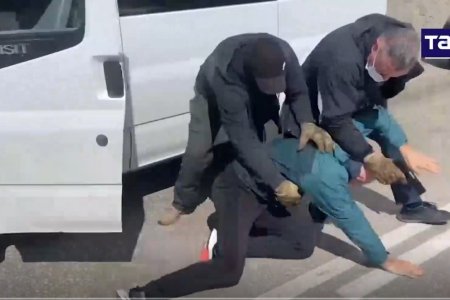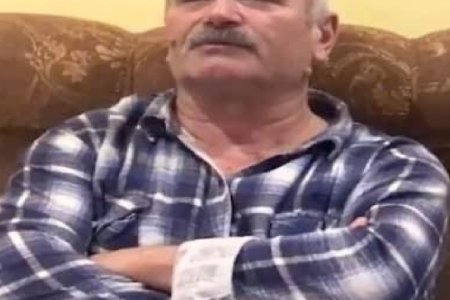
Russia’s notorious Southern District Military Court has sentenced Kostiantyn Horlynchenko to eleven years in the latest of at least 101 sentences on suspect ‘terrorism’ charges it has passed against Ukrainians since the beginning of 2024. The case against the 29-year-old Ukrainian from Sevastopol was also one of a number where the defendants are claimed to have planned railway partisan acts of sabotage which were, purportedly, thwarted by vigilant ‘enforcement officers’. There was, however, one striking difference from the usual template indictment, with the prosecution claiming, and the ‘court’ accepting that Horlynchenko had contacted Ukraine’s Security Service by email in order to offer his services. Russia’s FSB has long understood that plausibility is not required in politically motivated trials of Ukrainians, but this is insultingly absurd.
The Crimean Human Rights Group first reported on 13 November 2024 that Russia’s FSB had announced the arrest of yet another Ukrainian on ‘sabotage’ charges. The FSB did not name the person, calling him simply a 29-year-old resident of Sevastopol. It was claimed that he had planned to set fire to equipment on railway tracks near the Balaclava Hydro-Electric Station, with this purportedly on instructions from Ukraine’s Security Service [SBU]. It was asserted that the man had established contact for the purpose of ‘confidential cooperation’, with the SBU in September 2023. As is generally the case, the FSB produced a video in which the person says that, for remuneration, he was supposed to provide the SBU with photos and videos of special equipment near the hydro-electric station in Sevastopol. Later, he had, purportedly, been offered a thousand dollars if he set afire to that equipment. The FSB claimed that he had received 100 dollars for the inflammatory substance and that he had poured this into bottles but had been detained on the way to the railway tracks.
All of these elements – the videoed ‘confession’; the claim that the person was acting for money, etc. – appear in virtually all such cases. Where the person ‘confessing’ has later been released or at least allowed an independent lawyer, they invariably retract such ‘testimony’ as having been extracted through torture.
Virtually all Russia’s prosecutions of Ukrainians abducted from occupied territory involve allegations that the person was working for the SBU or Ukraine’s Military Intelligence, with the FSB almost always trying to present this as being for remuneration. This makes a nonsense of the additional claim on this occasion that Horlynchenko had himself contacted the SBU by email. Even if he were naïve enough to not understand that such emails would certainly be discovered, the SBU are not.
Horlynchenko was accused of ‘cooperation with a foreign state on a confidential basis’, under Article 275.1 of Russia’s criminal code and of an attempt to carry out ‘a terrorist act’, under Articles 205 § 1 and 30 § 3.
Although the CHRG report and, seemingly, the information from the FSB emerged in November 2024, this was long after Horylychenko was first seized, and after the case ended up in court. Assuming that he is the person referred to, then the indictment against him was passed to the Southern District Military Court, under ‘judge’ Igor Vladimirovich Kostin on 13 September 2024, with the preliminary hearing held shortly afterwards. There were a few hearings, with this possibly meaning that during the trial Horlynchenko denied the charges. The trial was, however, almost certainly held behind closed doors, and it is unclear whether the Ukrainian was allowed access to an independent lawyer.
The sentence was announced on 10 January 2025 with Horlynchenko convicted and sentenced to eleven years’ maximum-security imprisonment, with the first three years in a prison, the worst of Russia’s penal institutions. The verdict can still be appealed, though not one such case has ever resulted in anything but a minimal reduction in sentence.
According to the court’s press service, it was supposed to have been established that Horlynchenko emailed the SBU on 11 September 2023, “expressing the desire and willingness to cooperate with the said foreign state on a confidential basis.”
“During the period from 11 September to 31 October 2023, an SBU official contacted Horlychenko and offered cooperation on a confidential basis through carrying out various tasks, including carrying out an arson attack on two railway signals boxes”
It is asserted that during this same period, Horlynchenko photographed and took video footage of the part of the railway tracks, sending this to the SBU official, and also purchased the components for preparing the homemade inflammatory mixture and prepared them at his home. He was seized on 31 October 2023, purportedly while on his way to carry out the alleged railway sabotage.
Russia has been claiming to have ‘thwarted’ acts of sabotage in occupied Crimea since shortly after its invasion and annexation. In all earlier cases, enough is known to be confident that the victims are political prisoners and that the charges were fabricated. Although it is possible that railway partisans are behind some of the reported explosions on railway tracks, these are in no way ‘acts of terrorism’ but resistance against an aggressor state, illegally using the railway to transport weapons of destruction, ammunition and supplies for the invading army. It has also been clear from the methods used, especially the abductions of Crimean Tatars and other Ukrainians, and likely torture, that there are no grounds for assuming substance to any of these given cases and huge sentences.
See also:
Ukrainian sentenced to 22 years as ‘rail partisan’ in Russian-occupied Crimea
Russian FSB make mass arrests, claiming they 'thwarted Ukrainian terrorist plot' in occupied Crimea



